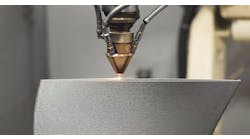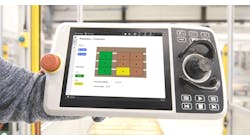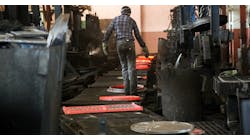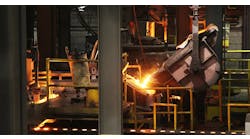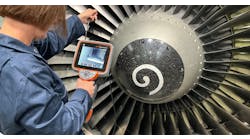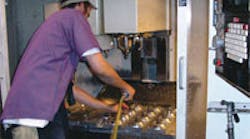The automotive aftermarket industry has developed into a lucrative niche for contract machining shops in recent years, including Service Tool in Little Rock, AR. As of now, Service Tool is exclusively producing an aluminum throttle body “spacer” that enhances power, torque, and fuel efficiency. The 16-year-old company began manufacturing the patented products (marketed as Poweraid TBS and Aircell) in 1996, and since then it has deemphasized its various other small-batch contract work so that it can produce as many as of 2,000 of the throttle body components per week.
These spacers have a distinctive set of helix bores that cause a spinning action of the incoming air-charge as it passes through the throttle body. They are popular with sports car enthusiasts because they improve engine “performance,” with heavy-duty truck operators who want to improve fuel efficiency, as well as operators of vehicle fleets that want to enhance fuel economy.
“We’re running 120 different part numbers for the throttle body spacer, to accommodate a full range of engines and vehicles,” says Service Tool president Larry Patterson. “The first spacers were for our own trucks. Then, the word got out, and now there are well over 800,000 of them in the field. The market for the product is still growing. New applications include non-automotive uses, such as irrigation pumps.”
To machine these spacers Service Tool relies on five MAG Fadal VMC 4020 vertical machining centers. The Fadal (www.fadal.com) machines are responsible for holding tight tolerances on the helix bore. Accurate circular interpolation, including the Z-axis upward movement, is critical to the quality of the product. Up to 40 offsets are used to machine batches of parts on a single fixture. “We’re currently running one long 12-hour shift,” Peterson explains. “Reliability is important, and the Fadal VMCs have delivered. Our oldest 4020 is 12 years old, and we’ve never had a major problem with it.”
The MAG Fadal VMC 4020 table size of 4820 in. (1,219508 mm) fits Service Tool’s work well. The machine is capable of 900 IPM rapid traverse, saving cycle time on ganged part batches. Maximum spindle speed is 10,000 RPM. Fadal’s “Cool Power” ensures thermal stability for consistent positioning repeatability. Flame hardened box ways provide high rigidity and vibration dampening that enhances accuracy.
“The Fadal MP CNC control works well for us,” says Patterson. “We’ve found it to be very ‘conversational,’ and all of the programming is done at the machine. Every part number has its own profile, so there is input needed to create a new program, but it’s basically just a fill-in-the-blanks process. When we add new models, the part program practically writes itself.
“We’ve found that there is more money to be made in production than in job shop work, if you get the right machines,” he concluded.
